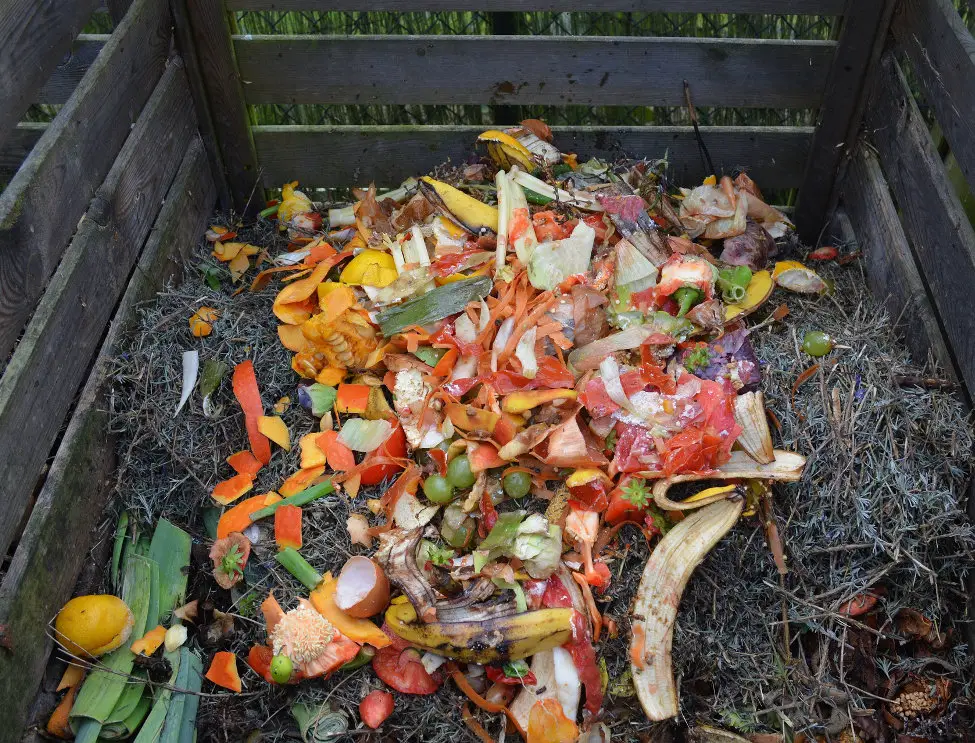There are numerous benefits of starting your own compost bin including sending less waste to landfill, reducing pollution, and promoting the growth of fruits, vegetables, flowers, and other plants.
In this post, we’ll talk about how to start a composting bin. You can easily and quickly start your very own compost pile today.
What is composting?
Composting is a process by which organic matter, such as leaves and food scraps decomposes, into a valuable fertilizer that can enrich soil and plants.
Anything that grows decomposes eventually, composting simply speeds up the process by providing an ideal environment for fungi, bacteria, and other decomposing organisms to do their work.
Recycling your food scraps and other organic matter into compost provides lots of benefits, including waste reduction, soil enrichment, and a lower need for synthetic fertilizers.
The resulting decomposed matter, which often ends up looking like fertile garden soil (aka ‘black gold’), is called compost and is rich in nutrients.
What can you compost?
Many organic items can be composted, including lawn trimmings, food scraps, and several other materials. Here is a list of some of the things you can include in your compost bin:
- fruit and vegetable peel and scraps
- crushed eggshells
- grass clippings
- hair and fur
- paper, cardboard, and shredded newspaper
- leaves
- old flowers
- coffee grounds and paper filters
- wood chips
- houseplant trimmings
- used tea
What NOT to compost
While the opportunities for items you can compost are almost endless, there are several types of things you should leave out of your compost pile. if you want to have a successful and safe fertilizer in the end. Here is a list of some of the things you should NOT put in your compost bin:
- diseased plants
- pet droppings (apart from chook manure)
- oils or greasy foods
- glossy paper
- weeds with seeds
- treated timber
- meat and bones
- dairy products
- seafood products
- plastic products
Start composting
Composting is easy and knowing how to set up a garden composting system can take your gardening effort to the next level.
Here are some simple steps on how to get started:
- Find your ideal spot
- Build your pile
- Mix often and keep it moist
- Cover to retain moisture, heat, and nutrients
- Distribute the compost
Find your ideal spot
The size of your backyard will determine whether you should use a composting bin or tumbler, or have a garden compost pile. For smaller backyards, composting bins and tumblers are good options.
Choose a dry and shady area that is away from your house but close enough for your garden hose to reach.
Build your pile
There are two broad categories that you can put in your compost pile: green and brown
Alternate layers of brown and green material and aim for a 4:1 ratio of browns to greens. Browns include straw, dry leaves, small wood chips, shredded newspaper, and cardboard. Greens include grass trimmings, vegetable and fruit scraps, used tea, coffee grounds, crushed eggshells, and other garden waste.
Make sure your food scraps are covered with a layer of brown materials to prevent flies and smells. Add water after each layer to keep the pile moist but not too wet.
Mix often and keep it moist
The more often you turn and mix the compost pile, the faster it will decompose. Moisten the material with your garden hose and use a shovel or rake to mix it up. Make sure to mix the pile thoroughly at least fortnightly.
Cover to retain moisture, heat, and nutrients
It is recommended that you cover your pile to trap the heat and aid the composting process. You could use a tarp or piece of carpet for this. While rain is a good thing for your plants, it will wash the nutrients out of your compost and deposit them in the ground below if the compost pile is not covered.
Distribute the compost
The compost is ready for use when it’s a rich brown color and crumbles easily. This could take a few months, depending on the size of your compost pile. Remember that the smaller the items are, the faster they will decompose.
Compost is a great soil conditioner that adds nutrients and helps your garden retain moisture. It also reduces the need for synthetic fertilizers.
In conclusion, composting has many benefits for the environment and for your garden and starting is very simple.
